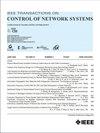PDE-Based Leader-Following Coordination Control for Flexible Manipulators With Event-Triggered Communication Over Directed Graphs
IF 4
3区 计算机科学
Q2 AUTOMATION & CONTROL SYSTEMS
引用次数: 0
Abstract
In this article, we address the leader-following coordination control issue for flexible manipulators modeled by fourth-order partial differential equations (PDEs) within an event-triggered communication framework. Most of the existing research on the coordination control of multiple PDE systems assumes that the communication topology is undirected and that communication between neighboring agents is continuous, leading to significant consumption of communication resources. However, in this study, the communication topology among the virtual leader and followers is described by a directed graph, where the leader's reference signal is accessible only to a subset of the followers. Moreover, an event-triggering mechanism is proposed to avoid continuous signal transmission among agents, effectively mitigating the communication burden. An adaptive boundary control scheme based on filters is designed for each following flexible manipulator to track the leader's angle and eliminate unexpected vibrations in the presence of unknown external disturbances. All the signals of the closed-loop system are uniformly bounded. Simulation results show that the presented control scheme is effective.基于 PDE 的有向图上具有事件触发通信功能的柔性机械手领导-跟随协调控制
本文章由计算机程序翻译,如有差异,请以英文原文为准。
求助全文
约1分钟内获得全文
求助全文
来源期刊

IEEE Transactions on Control of Network Systems
Mathematics-Control and Optimization
CiteScore
7.80
自引率
7.10%
发文量
169
期刊介绍:
The IEEE Transactions on Control of Network Systems is committed to the timely publication of high-impact papers at the intersection of control systems and network science. In particular, the journal addresses research on the analysis, design and implementation of networked control systems, as well as control over networks. Relevant work includes the full spectrum from basic research on control systems to the design of engineering solutions for automatic control of, and over, networks. The topics covered by this journal include: Coordinated control and estimation over networks, Control and computation over sensor networks, Control under communication constraints, Control and performance analysis issues that arise in the dynamics of networks used in application areas such as communications, computers, transportation, manufacturing, Web ranking and aggregation, social networks, biology, power systems, economics, Synchronization of activities across a controlled network, Stability analysis of controlled networks, Analysis of networks as hybrid dynamical systems.
 求助内容:
求助内容: 应助结果提醒方式:
应助结果提醒方式:


